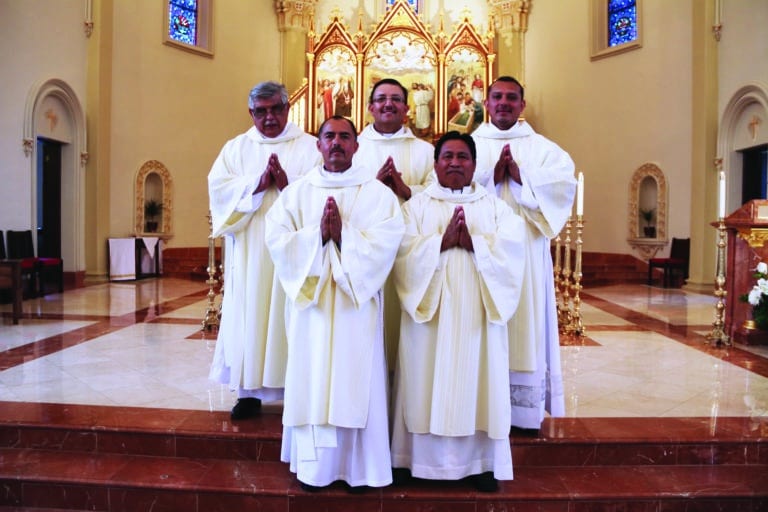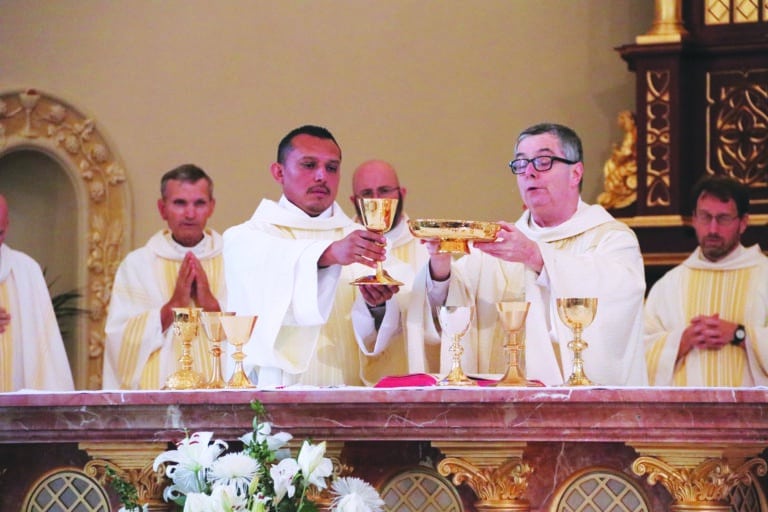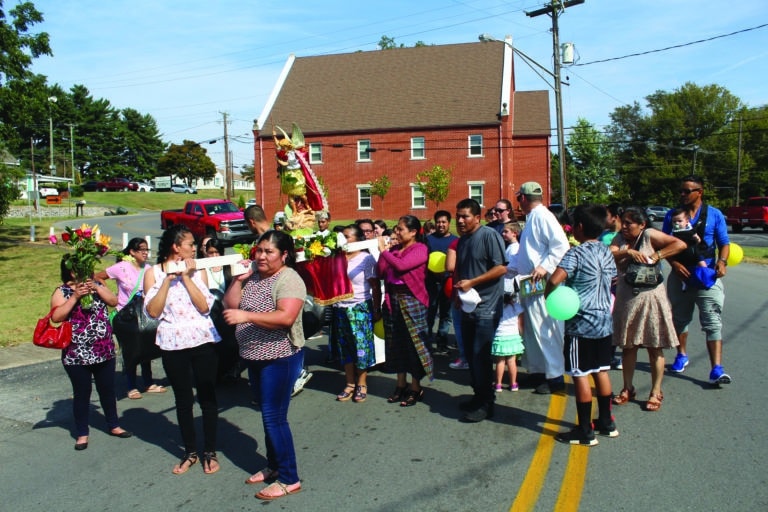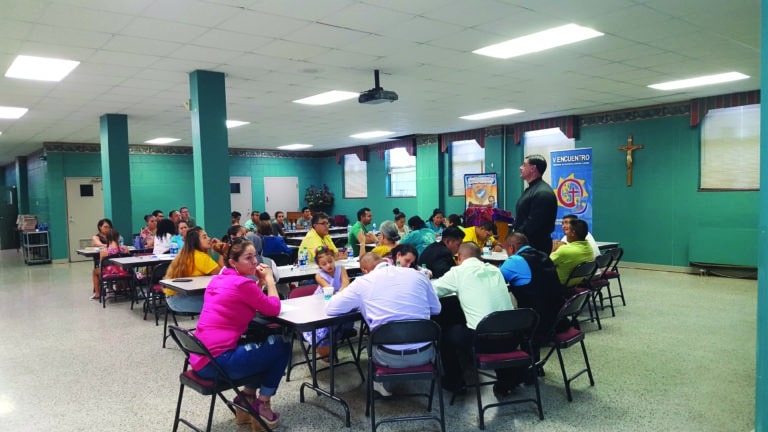SEE
There are currently 14 parishes that have some form of Hispanic/Latino Ministry. There are significant differences among the pastoral realities of these parishes.
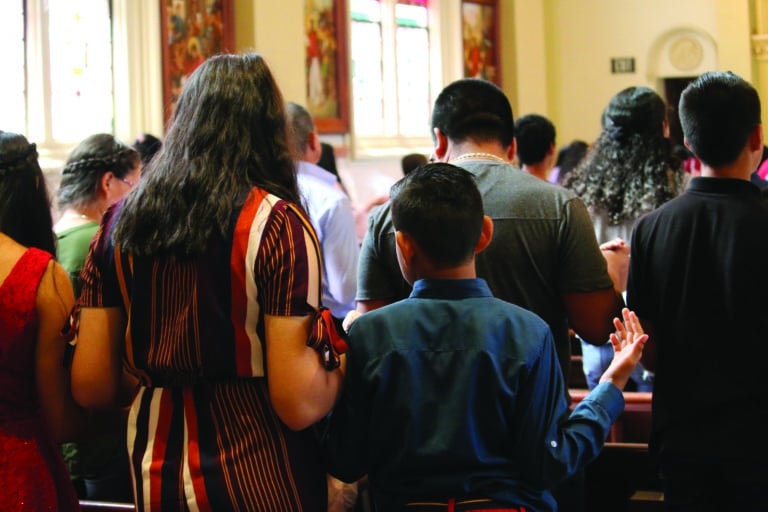
Some parishes only have a Mass in Spanish with a few families. They are in the first phase of welcoming the Hispanic/Latino community and developing ministries dedicated to them. They have very few bilingual human resources and there are still no leaders who have emerged from the Hispanic/Latino community. The established communities in these parishes need to grow in knowledge and develop intercultural attitudes and skills in order to create a welcoming space and be able to integrate the Hispanic/Latino community in the parish over time. Hispanics/Latinos in these parishes need basic formation and training to serve as liturgical ministers, including music ministry.
However, in most of these 14 parishes, they have had Mass in Spanish for several years and already have an established Hispanic/Latino community. Hispanics/Latinos feel welcome and that they belong to the parish. There are already ministries dedicated to the Hispanic/Latino community and Hispanic/Latino leaders have emerged who want to help and become more committed. These emerging leaders need to learn more about the faith and develop their leadership skills. They need help to discern their gifts and charisms to become pastoral agents in specific ministerial areas and then to be trained for these ministries (for example, to be catechists for children, to lead small faith communities, youth ministry leaders, advisers for young adults, mentors couples, family ministry, etc.). They need accompaniment to feel encouraged and to persevere in ministry.
Some of these parishes have a lot of human resources to serve the Hispanic/Latino community including several committed leaders. Hispanics/Latinos have a sense of ownership of the parish and its ministries. In some parishes, Hispanics/Latinos make up a majority of the parishioners. It should also be noted that good stewardship includes financial support for parishes and learning about the economic needs that parishes have. In these communities, the committed leaders need support and training to further integrate into the parish and be pastoral agents for the community at large. Some, for instance, want to support neighboring parishes or diocesan initiatives in different ministerial areas.
FILE PHOTO Bishop William F. Medley ordains five men for the first Hispanic/Latino class of permanent deacons during Mass on Sept. 14, 2019. The newly ordained deacons are Trinidad Soriano (Hopkinsville), René Amaya(Bowling Green), Edwin Pacheco (Russellville), José Blanco (Mayfield), and Baltazar Rafael (Sebree).
JUDGE
“If Hispanics/Latinos are to have a bigger role in the life and leadership of the ecclesial community at all levels, the Church must make a prophetic commitment to the integral education of all members of the community…Opportunities for formation in the Christian life, as well as a holistic education to overcome daily challenges and struggles, can then be provided to a wider audience. The fruit of these efforts will be good will toward the Church and a broader pool of potential leaders who have developed the human tools for pastoral ministry and leadership in a missionary key.” (P&C, p. 62)
“Genuine spiritual accompaniment always begins and flourishes in the context of service to the mission of evangelization. Paul’s relationship with Timothy and Titus provides an example of this accompaniment and formation which takes place in the midst of apostolic activity. Entrusting them with the mission of remaining in each city to “put in order what remains to be done” (Titus 1:5; cf. 1 Tim 1:3-5), Paul also gives them rules for their personal lives and their pastoral activity. This is clearly distinct from every kind of intrusive accompaniment or isolated self-realization. Missionary disciples accompany missionary disciples.” (EG 173)
“The Holy Spirit also enriches the entire evangelizing Church with different charisms. These gifts are meant to renew and build up the Church.” (EG 130)
Pastoral leaders embrace pastoral, spiritual, human and intellectual formation, and are interculturally competent. (cf. LMD, p. 24-25)
“Formation for these leaders [catechists and lay leaders] should be ongoing and lifelong, with a constant process of learning about the lived reality of the people they serve in the local community.” (P&C, p. 75)
“In some parishes, the pastoral staff itself is an obstacle to accompaniment and integration due to its limited linguistic, cultural and intercultural competence. For this reason, it is important to include language studies as well as topics of intercultural competence and the theory and practice of Hispanic/Latino ministries…in formation programs… continuing education for current leaders.” (P&C, p. 62)
“Changing the approach to pastoral care and accompaniment will advance the integration of the Latino community into the life and leadership of the Church. Care should be taken to ensure that this effort leads to ecclesial integration, with all sectors of the parish or diocese moving together toward a common vision for pastoral practice, rather than establishing separate tracks of pastoral ministry for Hispanics and non-Hispanics, or forcing the Latinos to assimilate into structures and pastoral frameworks of the prevalent cultural group(s) in the community.” (P&C, p. 61-62).
In the pastoral experience in shared parishes across the United States a process of ecclesial integration has been discerned with three phases with several movements in each phase:
- Welcoming – The parish is creating a space of hospitality and developing ministries for Hispanics/Latinos
- Belonging – Hispanics/Latinos already have a sense of belonging to the parish and are already developing leadership
- Ownership – Hispanics/Latinos have already come to feel ownership of the parish and work in collaboration and in a co-responsible way with the entire parish, it is time to emphasize the importance of sharing time, talents and treasure.
ACT
Parish leadership is encouraged to discern local actions to welcome and integrate the Hispanic/Latino community into parish life and foster leadership in the Hispanic/Latino community. See Appendix C for references from the documents to study the topic further and questions for local discernment.
Diocesan-level projects:
Create a Diocesan School of Hispanic/Latino Formation to provide formation opportunities for Spanish speakers in the diocese. (Collaboration between the Offices of Hispanic/Latino Ministry, Evangelization & Discipleship, Faith Formation, Worship, Marriage & Family Life, Youth & Young Adult Ministry, Stewardship & Development and Catholic Charities)
- Assess the formation needs in the diocese and the resources that are already available (2021-22)
- Explore the possibility of participating in the V Encuentro Ministerial Series as a diocese (2021-22)
- Hire teachers or create/purchase formation resources that are still needed (2021-22)
- Identify leaders in each region to be formed. It will include leaders of ecclesial movements, catechists, couples who want to accompany other couples, youth ministry leaders, leaders of small faith communities, liturgical ministers and those who want to connect those in need to services in the community. (2021-22)
- Offer formation modules in Spanish about: deeper faith formation, stewardship, leadership development, safe environment and the protection of vulnerable people, identifying gifts and charisms, and ministry training in specific ministerial areas.
- Offer professional development for priests, diocesan and parish staff, and parish leaders about the Hispanic/Latino community, ecclesial integration, and intercultural skills. (Ongoing)



